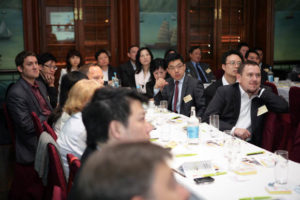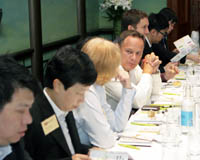

Filipowski, founder and CEO of Platinum Technology Inc. grew the company from start up into the eighth largest software company in the world—with over 15,000 employees globally—before selling it for a staggering US$4 billion. Today, he is founder & CEO of SilkRoad Technology and as such presented his thoughts and ideas on employee retention, engagement and empowerment in an entrepreneurial setting.
Filipowski commented on prominent issues faced not only by the IT sector, but by companies in all sectors. A key issue highlighted was that of employee engagement and empowerment. He advised that in order for companies to be successful, they not only need to be the best, but they also need to offer the best to their employees, and those employees need to be empowered to be effective. He stressed the importance of HR in any business, and the fact that it should be a large, if not the biggest, part of any business, and be fully integrated with all levels of management in order to be fully effective.
Many successful companies in the modern world follow the ‘upside-down-pyramid approach’ to employee management, which Filipowski explained helps HR place more value on the employee than ever before. He advised that in order to be successful with employee engagement, HR managers must place emphasis on four major aspects.
Aspects of employee engagement
- Corporate culture
- Brand recognition
- Reputation
- Engagement from all levels of management
He added, “Without all these aspects in a business, there can be no success.” He conceded that achieving this was no mean feat, and pointed out several problems HR faces relating to staff engagement and empowerment in the workplace. He intimated that one of the biggest challenges to HR was that, “…without proper leadership and an established culture, HR just becomes a bureaucratic process where corporate culture is not built and maintained…or there may be no clearly defined corporate culture at all.” He cautioned companies that still maintained this style of HR management would not be successful in the long run. Another problem he highlighted was that many companies with an established culture are not doing enough to keep employees engaged throughout their lifecycle with the company and beyond.
Filipowski then offered a number of practical suggestions, on ways to both engage staff, and enable them with the tools they need to succeed themselves, and help the business succeed. “Once employees have been enabled and are happy, there is a high chance companies will see an increase in profit and customers—both return and new”, said Filipowski. He then laid out some basic advice for companies to help them achieve this.
Multilevel management involvement—all levels of management must be involved and engaged with the HR department, and must recognise that human capital management is the most defining part of any company.
Brand recognition—after managers have been engaged, companies need to build, engage and develop brand recognition, while also having a defined culture and reputation. Once this has happened, companies will begin to see that people desire to work for that company, and will covet the opportunity to head over to that company. Providing staff with the freedom to experiment with ideas, and nurturing a culture of ‘not being afraid to take risks’ is also critical according to Filipowski, who encouraged HR to say to staff, “You are an adult, act like one.”
Musicians not MBAs—after companies have established themselves as a leading employer, and attract the best quality employees, they also need to ensure that those employees fit in well with the organisation.
So, in order to hire the best, companies need to look at how they are hiring and adopt good hiring processes. HR should not just look at resumes, but instead at the process of how to identify who is the best.
According to Filipowski often psychometric tests and CVs are not always the best ways of determining if someone is the right fit for a particular job function. Instead he advised HR to look at key attributes of successful members of the incumbent team as a cue for skills to look for in new recruits. By way of example he pointed out that many in the IT sector also had excellent musical talents. Filipowski argued that looking for traits such as musical ability—beyond the usual workspace—may also significantly help in the selection process.
The lifecycle of the employee begins before they have joined the organisation and Filipowski was insistent that, “…employees must be onboarded and ready to go from day one… a 100% ready employee will be more likely to stay with the organisation.”
After employees have joined the company and have settled down, Filipowski pointed out that it is HR’s responsibility to keep constant communication, contact, and conduct proper performance reviews and learning follow-ups throughout the employee’s lifecycle.

Filipowski summed up, “Take care of your employees, enable your employees, and they will take care of your company.”
About Flip
- Flip was born in Chicago, Illinois, USA
Key accomplishments
- Founder and CEO of Platinum Technology Inc. which he grew into the eight largest software company in the world with over 15,000 employees. The US$4 billion sale of the organisation is still the largest single cash transaction for a software company.
- Named one of the 100 most influential people in the information technology sector.
- Awarded ‘Entrepreneur of the Year’ from both Ernst & Young and Merrill Lynch.
Key postings
- Executive Vice President and COO, Cullinet Software, Inc
- Founder of Platinum Wildlife Foundation
- Founder of the Filipowski Foundation
- Currently Executive Chairman and CEO of SilkRoad Technology







